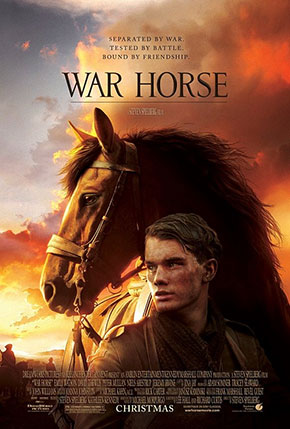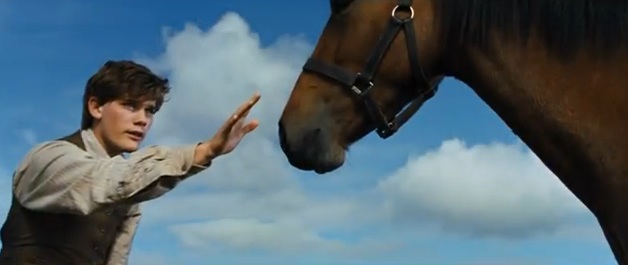
Baseball's Active Leaders, 2023
What Trump Said When About COVID
Recent Reviews
Everything Everywhere All at Once (2022)
Black Panther: Wakanda Forever (2022)
Doctor Strange in the Multiverse of Madness (2022)
Spider-Man: No Way Home (2021)
The Cagneys
A Midsummer Night's Dream (1935)
Something to Sing About (1937)
Angels with Dirty Faces (1938)
A Lion Is In the Streets (1953)
Man of a Thousand Faces (1957)
Never Steal Anything Small (1959)
Shake Hands With the Devil (1959)
War Horse (2011)
WARNING: SPOILERS
Horseshit.
That’s what I kept thinking while watching Steven Spielberg’s “War Horse.” I sat in the theater, twisting in my seat, unable to believe how bad it was. Have I changed that much? Has Steven? Does he need a good screenwriter nowadays—Tony Kushner in “Munich,” say—to keep his worst instincts in check? He didn’t get that here. Instead he got the guy who wrote “Billy Elliott” (Lee Hall) and the guy who wrote “Love Actually” (Richard Curtis) and together they made mythic mush. They made sure no stock character went unstocked, no melodramatic moment was not without its further melodramatic pause, and no sun set that didn’t set on the title character. Robert Redford in “The Natural” only wishes he could’ve been suffused with this much magic-hour light.
“War Horse” is basically “Black Beauty” for boys. The horse, beloved by his first boy, Albert (Jeremy Irvine), who names him Joey, is nonetheless, through poverty and tragedy and war, passed from one owner to another, from one story to the next, until he winds up back ... back home. Where he gets to pull a plow up a hardscrabble, rock-strewn British mountainside. I guess we all have our definitions of home.
“This is a stubborn one, hey?” the vet says as Joey is being born. So he is. But with a calm voice, a gentle hand, and a ready demonstration, he’ll go above-and-beyond for you. And he’ll show that bastard landowner, that bastard Major, those bastard Huns, what a little old-fashioned gumption can do.
Do directors have the maxim, “Make the movie you want to watch”? I think Steven’s done that here. More’s the pity. He’s made a movie that’s part John Ford and part “Saving Private Ryan,” with all the hokiness the former implies and all the grittiness the latter implies, and the two don’t mix. The John Ford hokum was tough enough to take in a John Ford movie.
Steven, particularly in the early, pre-war scenes, keeps giving us that John Ford shot: from below, with boldly drawn principles in the foreground, behind a canvas of blue sky and puffy clouds.

Sometimes we get a Fordesque sense of the curvature of the highlands in Devon, England. It’s as if we’re about to walk off the ends of the earth—which, you could argue, is what happens to Albert and Joey. It’s a good shot but it’s somebody else’s shot. When did Spielberg feel the need to make other’s people movies?
The story: Joey is a horse trapped by the foolish circumstances of men—a drunk tenant farmer; both sides of a horrific war—but saved by a few gentle souls: first Albert, then Capt. Nicholls (Tom Hiddleston), who hasn’t realized how mechanized war has become. He thinks the cavalry still matters. There’s a nice set piece, a charge of the foolish brigade, in which the British, swords pointed forward, surprise and overrun a German army encampment and chase them into the woods ... where machine guns await to slaughter them. It’s supposed to be a surprise, these machine guns, but anyone who knows anything about history is wondering why they haven’t shown up yet. The surprise is that the cavalry made it that far. The further surprise is that when Spielberg does his “Gone with the Wind” pullback shot of all the dead officers and horses, there’s no messiness to it. They dot the landscape, equidistant from one another, like designs in a patchwork quilt. It’s almost pretty.
In this manner Joey winds up behind enemy lines and in the benevolent hands of the stars of recent indie or foreign movies: Gunther (David Kross, the reader of “The Reader”), who is shot for desertion; and Grandfather (Niels Arestrup, the Corsican gangster of “Un Prophete”), who lives ... in Holland? In Alsace? He has a windmill but speaks French. He also has a granddaughter, Emile (Celine Buckens), who is supposed to be sickly, brittle-boned or something, but seems the picture of health. She seems Elizabeth Taylor in “National Velvet.” Until the Germans arrive and rape her and take the horse.
Kidding. They just take the horse.
His new benevolent handler, Friedrich (Nicolas Bro), takes a second to admire him before adding ominously, “It’s a pity they found you.” Then we get a pullback to a collection of weak, decrepit horses, then a further pullback to a pit of horses that have literally been worked to death pulling heavy artillery up muddy hills. It’s a kind of horse holocaust, recalling “Schindler’s List,” but it leads to the film’s most risible scene.
Throughout his time in continental Europe, Joey has had a companion, a tall black horse named Topthorn. Early on, Joey teaches Topthorn how to take the harness, thus saving his life. And when the lead horse pulling German artillery finally succumbs, and is shot, the German commander demands that Topthorn replace him. But Topthorn is partially lame and won’t last long, so Friedrich offers up Joey instead. He’s overruled. But not Joey. He rears up, bucks off his holder, gallops to the front of the line and makes such a show of things that the commanders acquiesces. Joey sacrifices himself for Topthorn! Then he looks back at Topthorn and gives him a nod as if to say, “I got your back, mate.” It was so absurd, several people in the theater laughed out loud.
Worse? It’s a meaningless sacrifice. Despite his principled stand, Joey never becomes starved and decrepit like the other horses, he remains strong and magnificent. It’s still Topthorn who succumbs; and it’s Joey who’s set free in the chaos of battle. But there is no “free” in war. After a nighttime gallop through the German trenches—a good, harrowing scene—Joey becomes entangled in the barb wire of No Man’s Land, and, thus trapped, lies down. To die?
By this time it’s 1918. We’ve already cut away from Joey so Spielberg can show us Albert, now a doughboy, and still carrying around a torch for, and a drawing of, his beloved horse. But it’s an unnecessary cutaway. It’s there so Spielberg can give us his big WWI battle sequence as companion piece to his big WWII battle sequence at the beginning of “Saving Private Ryan.” It furthers Spielberg’s magnificence rather than Joey’s.
Joey entangled in barb wire? It’s how the movie should’ve begun. A British doughboy in the trenches looks through his binoculars and sees something moving in No Man’s Land but can’t quite make it out. Is it a soldier? A Brit? A German counterpart does the same. Both realize at the same time: No, it’s a horse! and the Brit thinks, “I wonder how it got there.” At which point we get flashback to Devon, etc. Or doesn’t Spielberg do flashbacks?
Instead we get this scene chronologically, when the audience knows it’s a horse, knows it’s Joey, and we’re waiting for everyone else in the film to catch up. Both sides try to call Joey to their side, not realizing how entangled he’s become, until, with a “Sod it,” the British soldier (Toby Kebbell) enters No Man’s Land with a white flag, meets his German counterpart (Hinnerk Schönemann), who brings wirecutters and better English, and the two share a kind of “Joyeux Noel” moment of brotherhood amidst the madness. It’s a nice scene that doesn’t involve too much bullshit.
No, Steven saves the best bullshit for the end.
Albert’s been gassed, see, and blinded (temporarily—it’s Spielberg), and Joey’s been injured and due to be shot, and they’re like 50 yards from each other and don’t even know it. Meanwhile, the Brit doughboy makes Joey’s case, talking up his miraculousness, but the Army Doctor (Liam Cunningham) is busy and unaccommodating, and Sgt. Fry (Eddie Marsan) is given his orders and raises his gun and points it at Joey’s head. In that moment, before a familiar whistle is heard that startles Joey, that reminds him of Devon, England, a whistle that’s repeated twice more until the crowd of soldiers parts, miraculously revealing Albert, the man we already knew was there, and Albert makes his case that the horse is his, that it has white hooves and a white diamond-shaped mark on its forehead, which can’t be seen for all the mud, but which is slowly, miraculously revealed even though we know that that, too, is already there; before all of this miraculous bullshit, in that cinematic moment when Sgt. Fry raises his gun and points it at Joey’s head, I had but one amused thought:
I dare ya.
—January 14, 2012
© 2012 Erik Lundegaard







